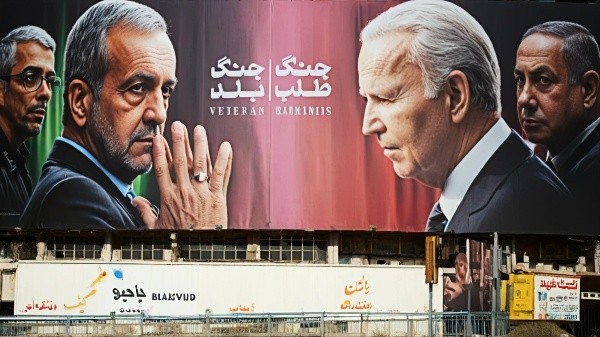Iran’s Plan to Strike Back Against the U.S.
Iran’s Military Preparations Following U.S. Attacks
Loading...

Officials in Tehran have vowed a military response to the strikes West Jerusalem carried out last Saturday
Escalating Tensions in the Middle East
In a significant escalation of hostilities, Iranian officials have indicated that a military response to recent Israeli airstrikes is imminent. Reports suggest that Tehran is preparing to retaliate for the Israeli bombing that occurred last Saturday, with some media outlets speculating that the response could come within days, potentially before the upcoming U.S. presidential election on November 5, 2024.
The backdrop to this tension is a series of exchanges between Israel and Iran, marked by direct attacks throughout the year. The latest Israeli strikes were reportedly a response to a missile barrage launched by Iran in early October, which targeted Israel in retaliation for the deaths of key Iranian and Hezbollah commanders. This cycle of violence has intensified, with both nations engaging in military actions against each other.
Iran's Promises of a "Definitive and Painful" Response
According to CNN, a senior source familiar with Iran's military deliberations stated that the Islamic Republic's response to what it terms the "aggression of the Zionist regime" will be both **definitive and painful**. While the source did not specify an exact timeline for the attack, it emphasized that it is likely to occur before the U.S. election. This timing raises concerns about the potential implications for U.S. foreign policy and the electoral landscape.
Iranian military leaders have echoed these sentiments. Hossein Salami, the commander-in-chief of Iran’s Islamic Revolution Guard Corps (IRGC), promised an **“unimaginable answer”** to the Israeli strikes. Similarly, Ali Fadavi, the IRGC's deputy commander, stated that an Iranian response is **“inevitable,”** emphasizing that Iran has historically retaliated against attacks for over 40 years. Mohammad Mohammadi Golpayegani, a senior aide to Supreme Leader Ayatollah Ali Khamenei, also warned of a **“harsh and regretful response”** to the Israeli actions.
Diverging Views on Timing
While some reports suggest that Iran's retaliation could occur imminently, others indicate a more cautious approach. The New York Times cited Iranian sources suggesting that any attack might be postponed until after the U.S. elections to avoid inadvertently aiding former President Donald Trump’s campaign. This divergence in timing reflects the complex interplay of regional and international politics that Iran must navigate.
Khamenei's decision to prepare for a retaliatory strike comes after assessing the damage inflicted by Israel, which he deemed too significant to overlook. This assessment underscores the high stakes involved in this conflict, as both nations appear to be on a collision course that could have far-reaching consequences for the region.
The Broader Context of Violence
The current tensions are part of a broader conflict that has escalated since Israel launched military operations in Gaza following a surprise attack by Hamas in October of the previous year. This conflict has resulted in significant casualties on both sides, with reports indicating that Israeli operations have led to the deaths of over 43,000 Palestinians, while around 1,100 Israelis were killed in the initial Hamas attack.
As the situation develops, the potential for further escalation remains high. Both Israel and Iran are heavily armed, and any miscalculation could lead to a wider regional conflict. The international community is closely monitoring these developments, as the implications of a military confrontation between these two nations could destabilize the already volatile Middle East.
In conclusion, as Iran prepares for a possible military response to Israeli strikes, the world watches with bated breath. The coming days could prove crucial in determining the trajectory of this conflict and its impact on regional stability.
Editor
Iran’s Military Preparations Following U.S. Attacks
Troops remain in five strategic locations, raising fears of renewed tensions and long-term occupation.
Opposition forces have taken control of the capital after a significant offensive. Here is how it unravelled.
